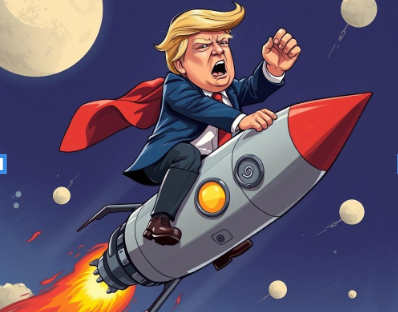$RTSI $USDRUB $BTC
#Putin #Trump #Russia #Ukraine #Ceasefire #Geopolitics #Markets #Investing #Oil #Sanctions #USD #Crypto
U.S. President Donald Trump and Russian President Vladimir Putin are preparing to hold a significant discussion on a proposed 30-day ceasefire in Ukraine. The call, expected to occur soon, comes amid heightened geopolitical tensions and continued volatility in global financial markets. Russia is reportedly seeking terms that could potentially lead to a broader resolution, though Western analysts remain skeptical of any long-term peace agreement. The ongoing conflict has contributed to fluctuations in key markets, including energy commodities, defense sector stocks, and foreign exchange rates, particularly the Russian ruble ($USDRUB). Investors are closely watching the developments, as any shift in the geopolitical landscape could have direct implications on oil prices, inflation expectations, and risk asset performance.
The financial markets have displayed heightened sensitivity to geopolitical developments, with commodities such as oil experiencing significant volatility. Russian equities, as represented by the RTS Index ($RTSI), have been particularly affected by sanctions and international economic restrictions. Meanwhile, cryptocurrency assets like Bitcoin ($BTC) have seen increased interest as investors seek alternative stores of value amidst uncertainty. The ceasefire discussions, if successful, could provide temporary relief to market nerves, particularly in energy markets, US equities, and European financial assets. However, a ceasefire without a broader de-escalation plan may lead to only a short-term stabilization in the financial landscape.
Global energy markets stand to be one of the most impacted areas following the ceasefire talks. Russia’s energy exports remain a crucial driver of oil prices, and any indication of successful negotiations could curb supply concerns and put downward pressure on Brent crude and WTI crude prices. Meanwhile, European nations, which have faced energy supply disruptions due to sanctions and the conflict, may see improved economic stability should a ceasefire lead to relaxed restrictions. Additionally, traders in foreign exchange markets will be monitoring the Russian ruble, as stabilization in geopolitical conditions typically strengthens currency value. The USD/RUB exchange rate remains a critical focal point for investors gauging risk sentiment in emerging markets.
Broader market implications extend beyond energy, as defense stocks, sanctions-related assets, and emerging markets could see significant movement based on the call’s outcome. If the negotiations lead to a meaningful reduction in hostilities, U.S. and European defense-sector equities, which have benefited from increased military spending, could see a pullback. Conversely, a failed agreement may fuel further geopolitical escalation, sparking demand for safe-haven assets such as gold, U.S. Treasuries, and Bitcoin ($BTC). Federal Reserve policymakers may also weigh geopolitical stability in their economic projections, as prolonged uncertainty could influence interest rate decisions and broader financial conditions. Investors and analysts will be watching developments closely, as geopolitical agreements often have long-lasting repercussions for financial markets worldwide.











Comments are closed.